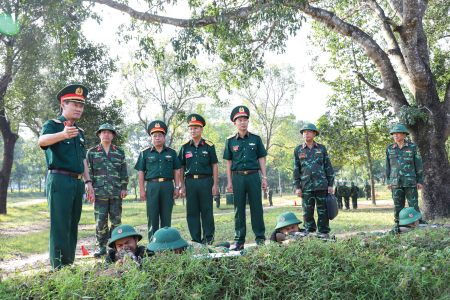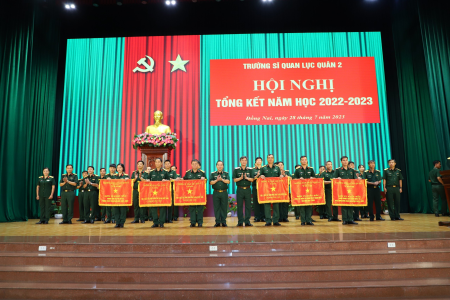Army College 2 grasps and implements Resolution No. 1657 of the Central Military Commission
On thoroughly perceiving the motto, “Training quality of colleges is combat readiness capacity of units”, Army College 2 focuses on leading and directing synchronous, drastic adoption of solutions, which aims to resolve to successfully complete Resolution No. 1657-NQ/QUTW, dated December 20th, 2022 of the Central Military Commission (CMC) on “reforming education and training to meet the requirement of building the military in the new situation.”
After 15 years’ implementation of Resolution No. 86/NQ-DUQSTW, dated March 29th, 2007 of the Central Military Party Committee (now CMC) on education and training in the new situation, the Army College 2 has gained fairly comprehensive outcomes through executing many solutions. Leadership of education and training is exercised regularly, strictly, seriously, and scientifically. The training programmes and content are regularly adjusted and supplemented to suit training objectives, requirements, and learners. A great deal of reform is carried out in teaching and learning methodologies. The corps of teachers and education management cadres is constructed and developed quantitatively and qualitatively and standardised step by step. The infrastructure and equipment in support of teaching and learning are invested and upgraded in a modern and synchronous direction. Quality of training and scientific research is enhanced. Graduates from the College have comprehensive quality and are capable of undertaking their initial positions as specified in training objectives and requirements. Nevertheless, reform of training programmes and content as well as the teaching and learning methodologies have failed to meet requirements yet. The number of teachers and education management cadres who are able to reach qualification standards have yet to reach the target. Some teachers’ competence in foreign languages and information technology as well as experience have shown certain limitations. Scientific research has not been on a par with potential and applied extensively in the teaching and learning process. Some graduates’ skills at work do not match realities in some aspects.
 |
| Commandant of the College checks its training work |
It is within this context that, after the CMC’s promulgation of Resolution No. 1657-NQ/QUTW, the College Party Committee and Managing Board have directed extensive popularisation among all subjects; mapped out plans to overcome limitations, step up reform and improvement of education and training quality in the new situation.
First, party committees and commanders at all echelons are to strengthening leadership of increased education and training quality. On the basis of guiding principles, goals, and solutions of Resolution No. 1657-NQ/QUTW and Plan No. 450/KH-BQP, dated February 20th, 2023 of the Ministry of National Defence (MND), the College Party Committee has put forward Resolution No. 816-NQ-DU, dated March 21st, 2023 on reforming education and training to meet requirements of building colleges and the Military in the new situation. The commandant of the College has issued Plan No. 1577/KH-TSQ to execute the resolution; requested departments and units to concretise reform objectives and enhance education and training quality in each school year and course. They have been advised to promote education and propagation with a view to bringing about dramatic changes in awareness and responsibility of cadres, party members, and the masses for this matter. To achieve effectiveness, the College concentrates on strengthening party committees, commanding organisations, and the corps of teachers and education management cadres in line with missions. The building of pure, strong party organisations is closely combined with making the Colleges, departments, faculties, and units comprehensively potent, “exemplary, and representative”. More importantly, the College associates implementing goals and targets specified by Resolution No. 1657-NQ/QUTW with carrying out Resolution No. 1659-NQ/QUTW on raising training quality and Resolution No. 1652-NQ/QUTW on leading military scientific work as well as the MND’s strategies and projects on education and training, which aims to conduct all working aspects and regard reform and enhanced quality of education and training as the utmost goal.
 |
| Awarding outstanding individuals in the 2022-2023 academic year |
On deeply grasping the guiding principles of the CMC, the College Party Committee and Managing Board lead and direct the building of an elite, compact, potent, in-depth, modern college; establishment and development of a corps of teachers and education management cadres on a par with requirements and missions. It is important to focus on building the College into a smart one, which is capable of meeting requirements of training high-quality human resources and contributes to building of a revolutionary, regular, elite, modern military. Accordingly, the College continues to seriously realise Decision No. 141/QD-TM, dated March 8th, 2021 of the Chief of General Staff on promulgating the Organisation table of the Army College 2 (in peacetime); makes every effort to construct an elite, compact, potent, standardised, modernised college with a healthy military pedagogic cultural environment, strict discipline, and self-discipline. Additionally, the College continues to undertake sweeping reforms of training management, step up devolution in training and scientific research, and improve quality of other working aspects. To bring into play achievements, the College pays further attention to establishment and development of the corps of teachers and education management cadres with sufficient quantity, proper structure, increasingly high quality, and ability to meet requirements of both short- and long-term missions. More importantly, it must successfully implement the project “Building a corps of teachers and education management cadres in the Military who are capable of meeting requirements of reforming education and training in the Military in the 2023 – 2030 period fundamentally and comprehensively”. The College strives for having over 75% of teachers and education management cadres as standard, 10% of teachers and education management cadres with doctorates, and 75% of teachers with experience in unit command and control by 2025. It also seeks to achieve the goals of having over 95% of teachers and education management cadres as standard, from 20% to 30% of teachers and education management cadres with capacity to work in international environment, etc., by 2030. To do so requires the College to further adopt synchronous ideology, organisation, policy measures to build its corps of cadres; closely combine planning, training, appointment, and use of cadres with promulgation of preferential policies towards cadres, which aims to encourage teachers and education management cadres to try their best and devote themselves to work. Moreover, the College keeps sending its teachers and cadres to units to improve their command-and-control capacity, accumulate experience, and apply their experience to management, teaching, and scientific research.
The College Party Committee and Managing Board lead and direct enhanced reform of training processes, programmes, and content; teaching and learning methodologies; examination and performance evaluation. The project of “Reforming cadre training processes and programmes at all echelons in the Military to meet requirements of missions in the new situation” is to be carried out effectively. Accordingly, the College concentrates on promoting leadership of standardising and modernising training; standardising expected learning outcomes for learners according to training objectives and requirements; review and improve training content and programmes for learners to ensure interconnectedness, integration, resemblance to realities, logic in each subject, term, school year, and course. Additionally, there is a need to further reform of teaching and learning methodology in a modern direction; leverage cadets’ activeness, proactiveness, and creativeness; promote cadres’ thinking capacity and practical skills. Of note, special importance is attached to application of information technology, digital transformation, and achievements of science and technology to teaching, learning, examination, and performance evaluation. Reforms are to be made in testing and evaluating training outcomes. Learners are appraised in terms of personal quality and comprehensive capacity. The College is committed to substantive teaching, substantive learning, and substantive evaluation, resolving to counter obsession with achievements and wrongdoings in education and training.
Furthermore, the College Party Committee and Managing Board attach importance to leadership of closely combining scientific research with education and training; standarding and modernising infrastructure and equipment; and accelerating digital transformation in education and training. It is necessary to continue to tap into the role of the College’s Science and Training Council, especially the science subcommittees of faculties, in scientific research in connection with teaching and learning. The science management work is to be reformed with a view to enhancing applicability of research projects and steering scientific research towards directly supporting the College’s education and training as well as pressing issues emerging in units, especially the renewal and perfection of training programmes and content for various types of learners in the direction of standardising expected learning outcomes. Moreover, the College continues to mobilise investment in upgrading and modernising infrastructure and equipment for teaching, learning, and scientific research in a modern, synchronous, united direction and in line with the standard for building a smart military college; leverage the utility of invested projects. New weapon systems, equipment, and simulation systems should be further provided for the College to match realities of combat training and readiness in units. Priorities are given to the upgrade and development of information technology infrastructure, which serves to create technological, technical foundation for accelerating digital transformation in education and training.
Given its political consciousness, high determination, and synchronous, drastic solutions, Army College No.2 resolves to successfully carry out Resolution No. 1657-NQ/QUTW of the CMC in order to make breakthroughs in enhancing education and training quality, deserving to be a centre for training command and staff army officers in the South and contributing to the building of a Military advancing towards modernity.
Major General, Doctor LUONG DINH LANH, Commandant of the College